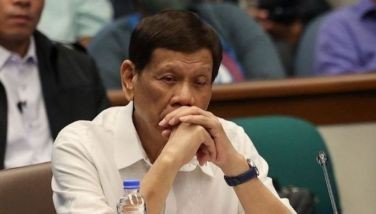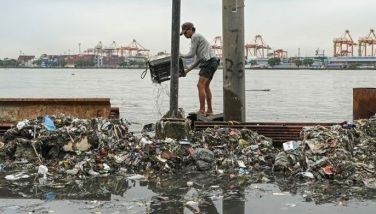'China will snub int'l tribunal ruling on sea row with Philippines'
HAIKOU, Nainan - China will not abide with any decision on the case filed by the Philippines before the International Tribunal on the Laws of the Seas (ITLOS) on the disputed islands in the West Philippines sea, a leading academic expert on South China Sea studies said here on yesterday.
Wu Shicun, president and senior research fellow of the National Institute for South China Sea Studies (NISCSS), made the statement despite the intensive campaign being waged by President Aquino and his administration to seek global support for the Philippines sovereign claims over the disputed islands in the West Philippine Sea.
“China will not follow the judgment when the tribunal makes the final award to this,” Wu said. Whether or not the tribunal’s judgment favor China, Wu does not think that the dispute between the two countries will be resolved.
The NISCSS is the “think tank” advisory body of the Central Government in Beijing on issues concerning the South China Sea (West Philippine Sea).
China has ignored the arbitration proceedings now pending before ITLOS. The Philippines filed a case before the United Nations Convention on Laws of the Seas (UNCLOS) regarding the dispute early this year.
“Currently, the Chinese authorities have no such idea to solve this dispute (via) international jurisprudence or arbitration. The reason why China is unwilling to solve this dispute through international jurisprudence is because the sovereignty issue is too sensitive and complicated and it will remain there without being resolved by the judgment,” Wu told a 15-man Philippine media delegation here.
China is very careful in handling this issue, Wu added.
China expects the ITLOS to come out with the a decision between January and March of 2016, which coincides with President Aquino’s last six months in office.
Better relations after PNoy
Wu admitted tjat China could perhaps expect better relations with the next administration in 2016.
“We used to enjoy our good relationship, economically and politically. The Philippines is China’s bigger neighbor. In this regard, I am optimistic that maybe after 2016, China will enjoy better relationship that it enjoyed before,” Wu said.
Wu recalled that the two countries have better relations before the Philippines pressed for international arbitration rather than bilateral negotiations of settlement of dispute, which prefers.
He added that the Baselines Law that also established the 200-exclusive economic zone (EEZ) of the Philippines also soured the relationship between the two countries.
The study institute confirmed the presence of as much as 20 to 30-billion tons of oil and natural gas equivalent in oil found within the nine-dash line claimed by China.
Wu said 60 percent of their estimated oil deposits in South China Sea can be found in the areas disputes by ASEAN Member-states -- Malaysia, Thailand, Brunei, Vietnam, Taiwan, Indonesia and the Philippines.
Bilateral talks pushed anew
Wu batted for the need to talk about the differences through bilateral means, where China and the Philippines would go for settlement mechanism without any third party involved like ITLOS.
“I think, the general practice to solve sovereignty issues should be left to the parties involved and make up by themselves,” Wu said.
He encouraged the Philippine government to assign a “special envoy” to improve current relations between the two countries.
“The problem now between the Philippines and China is the lack of mutual trust. The main way is to promote high-level meetings. Your President and my President should meet in the future to discuss how to improve the relationship," he said.
Wu said the high-level meetings can be made possible when President Aquino attends the Asia Pacific Economic Council leaders summit hosted by Beijing in November this year and possibly hold bilateral meeting with Chinese President Xi Jinping.
Another option was to withdraw the arbitration case “as a good gesture” to improve the Philippine-China relations, said Wu who was in Manila last December when he met with academic, economic, defense and security officials regarding the China position.
Wu revealed that he raised this possibility in his talks with a “senior official” of President Aquino, whose name he cannot recall.
Apart from withdrawing from the case, Wu also discussed China’s openness for joint development in the disputed islands that would show that something beneficial could also be reached despite the dispute.
Wu also expressed that once the case is withdrawn, Filipino fishermen can freely fish in the disputed area without being harassed and driven away by its Chinese coast guard ships patrolling the rich fishing grounds in the overlapping territorial waters of the two countries.
During the discussions, Wu also expressed the Chinese scholars opinion on the apparent move of the United States government to interfere in the dispute. He said the Enhanced Defense Cooperation Agreement (EDCA) signed by the US and Philippines last April was “aimed against China.”
“I don’t think US would not like to participate in the South China Sea dispute,” he said.
- Latest
- Trending


























